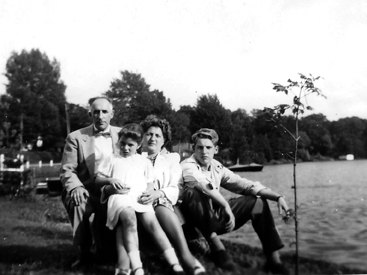A Family’s Flight From The Nazis Is the Subject of a Documentary


FLIGHT OF A FAMILY: Pictured after their resettlement in New York State, the Bauer family is the subject of a documentary by Dan Bauer, to be screened at Princeton Public Library this weekend.
Growing up near Buffalo, New York, Dan Bauer often heard the stories of his family’s harrowing escape from the Nazis. A comfortable Jewish family in 1930’s Vienna, they were forced to leave when Hitler began rounding up Jews and sending them to concentration camps. Mr. Bauer, who is McCarter’s Theatre’s communications director, knew about his grandfather’s time at Buchenwald, and how a family connection managed to get him released. He knew about the family’s eventual relocation to New York. He was aware of who had survived and who had not.
But it wasn’t until his grandmother was approaching her 100th birthday that Mr. Bauer began to feel that her story needed to be told. With the help of family members and friends, the novice filmmaker directed a documentary he called leben um zu sagen (“Live to Tell”), which will be screened Sunday, September 23 at 2 p.m. at Princeton Public Library. A panel discussion will follow the 30-minute showing.
“When my grandmother was 99, my stepmother mentioned to me that someone should get her story on video,” Mr. Bauer said over a cup of tea last week at Infini-T Tea and Spice Souk. “Once I started thinking about it, I knew I wanted to do it properly. I knew I would need a budget and some expertise to put together a project that would be a keepsake.”
Mr. Bauer’s younger brother agreed to help finance the project. Rutgers film student Mary Conlon, daughter of Princeton Public Library librarian Susan Conlon, was hired to do the filming. She was assisted by her father, a former cameraman at New Jersey Network. Mr. Conlon also loaned the equipment.
“I started to look at documentaries,” Mr. Bauer recalled. “I wasn’t happy with what I was seeing. They just weren’t what I wanted. They kind of left me cold.”
Mr. Bauer decided to reach out to Susan Wallner, a friend who used to work for New Jersey Network and now works for PMK Video. “Susan agreed to edit the film,” he said. So because I knew everyone involved, I was able to be a close part of the process. There was a lot of back-and-forth, a lot of integrating family photos into the story. It felt like a true collaboration.”
Beautifully coiffed and elegantly dressed, the subject of the film seems decades younger than her 100 years. Grete Bauer is comfortable in front of the camera, telling her family’s remarkable story of survival with quiet dignity.
Her grandson chose not to conduct the interviews himself. “I felt it was important to have someone young, who hadn’t heard the stories, asking her the questions,” he said. “I used Emilia LaPenta, who works at McCarter, and it worked well. I think it shows in the softness of my grandmother’s manner and the way she speaks about what happened.”
Mr. Bauer also had Ms. LaPenta interview his father Ulrich and his cousin Heinz Herling. “I knew my grandmother would tell the story, but I also knew my father and cousin could help put the story in perspective,” he said.
All of the interviews were conducted the weekend of Grete’s centennial birthday gathering, at the Highland Park assisted living facility where she moved from the house in Brocton, New York that was the family’s headquarters for decades. The “talking heads” in the film are interspersed with family photos, some of which Grete was surprised to see when she viewed the film, Mr. Bauer said.
Mr. Bauer visits his grandmother every Sunday. Though the film is finished, he still asks her questions and records her answers. “I’m trying to put something more together for the family, with photos,” he said. “There is so much more to tell.”
The two have always been close. “She lived 45 minutes away from us, and I saw her often,” Mr. Bauer said. “When I was in college, she’d drive over and drop off brownies at my dorm room door. Now that she’s here, I definitely find time to see her every weekend.”
Princeton Public Library’s Susan Conlon is pleased to screen leben, um zu sagen and not just because her daughter was involved in the creation. “I think that Dan has achieved value that will appeal to people on two levels: he has captured this important part of his own family’s story and by sharing it others can find meaning in it; and as a “document” it illustrates and inspires others to take time and steps to preserve these experiences in their families and with people in their lives,” she said.
While Mr. Bauer had written about his family’s experiences in college and graduate school, he never thought of himself as a third generation Holocaust survivor. “A friend recently said to me, ‘Isn’t it interesting that all of your creative work comes from this one subject?’ That really made me think,” he said.
The screening on September 23 will be followed by a panel discussion between Mr. Bauer, Dr. Paul Winkler of the New Jersey Holocaust Commission on Education, and Susan Hoskins, executive director of the Princeton Senior Resource Center.
“To me, this is more than a Holocaust story,” Mr. Bauer said. “I want to encourage people to get their family stories. Don’t wait until your grandparent is 100 years old. All senior citizens have a story to tell. I see this as a snapshot, by no means my grandmother’s full life story but of course a very important part of her story.”

